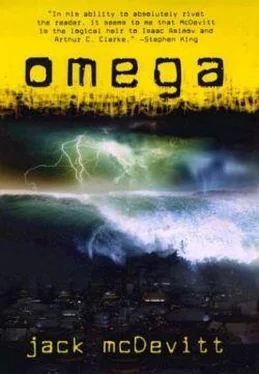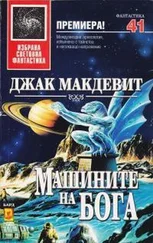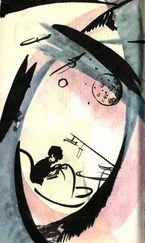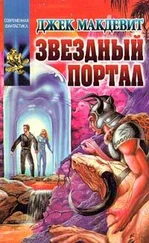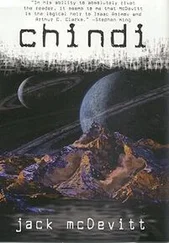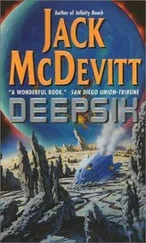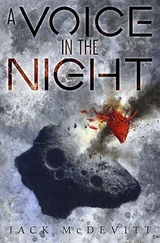For Jean and Scotty Parrish, USN
I’m indebted to Sara and Bob Schwager for their work with the manuscript; to Walter Cuirle, physicist and writer, for technical assistance; to Ginjer Buchanan, for editorial guidance; to Ralph Vicinanza, for being there; and to Maureen McDevitt for showing the way.
“Scientists have today confirmed that one of the omega clouds is indeed approaching Earth. First, I want to reassure everyone that it poses no danger to us. It is not expected to arrive in our vicinity for almost a thousand years. So neither we, nor our children, nor our children’s children, need be fearful.
“However, we are now aware that these objects have visited the Earth in the past, at intervals of approximately eight thousand years. Apparently, they destroy cities and will attack other kinds of construction. No one knows why. No one knows whether they are natural objects or the results of a perverted science.
“Our generation faces only one danger, that we might say to ourselves this is not our problem, and that we will pass it off to the distant future. That we might shrug and say to ourselves that a thousand years is a long time. That we will become complacent and conclude that this problem will take care of itself.
“But I say to you, we should take no satisfaction in the fact that we ourselves are in no physical danger. This is a hazard to our world, to everything we hope to pass on to future generations. And it is clear that we should act now, while we have the time.
“Therefore, I am directing that the full resources of the Council of Nations be brought to bear. We will learn how this cloud operates, and we will shut it down.”
— MARGARET ISHIRO, GENERAL SECRETARY, WCN
SEPTEMBER 9, 2213
On the surface at Brinkmann IV (“Moonlight”), in IC4756, 1300 light-years from Earth.
Autumn 2230.
IT WAS THE most majestic series of structures David Collingdale had ever seen. Steeples and domes and polygons rose out of ice and snow. Walkways soared among the towers, or their remnants. Many had collapsed. There were pyramids and open squares that might once have been parks or courtyards. An obelisk anchored the center of the city. It was a place out of time, frozen, preserved for the ages, a landscape that might have been composed by Montelet. A place of crystal and glass, and, in a kinder age, of flowering trees and shaped hedges and beckoning forest. Catch it at the right time, when its giant moon, half again as big as Luna, was in the sky, and one might have thought that here was the celestial city, Valhalla, Argolis, El Dorado by night.
It looked too ethereal to have actually served as a home for a thriving population. Rather, Collingdale could not get away from the sense that it had been intended by its builders as a work of art, to remain unused, to stand as a monument rather than a city. Several of the towers had collapsed, broken fragments rising out of a thick carpet of snow. Its name was unknown, so they called it Moonlight, the city and the world and the sense of something lost.
A bleak wind howled down the empty streets, chilling him even in the e-suit, which was apparently not functioning properly. He’d see to getting it adjusted when he got back to the dome. Wouldn’t want to have it fail out here at twenty below.
The sun was struggling to get above a flat mountain range. Several thousand years ago, something had gone wrong with it. Abrams had explained it to him, a surfeit of metals or some such thing. Just temporary, he’d insisted. Be back to normal, he expected, in another few thousand years. Not that it would matter.
He was at the equator, where the remnants of the once-global civilization had fled. There were other cities, most in areas that had once been equatorial, some buried in snowfields, still others frozen behind walls of ice.
He and his team knew little yet about the race that had lived here, except that they were a long time dead, and their architecture rivaled anything man had produced. Crystal bridges thrown across mighty rivers, hyperbolic domes, broad walkways in the sky. All frozen now, the bridges as well as the rivers, the crystal as well as the spirit.
It was perhaps a hard irony that Moonlight, which had thrived and died about the time humans were rolling stones out of quarries to build the first pyramids, would probably have remained undiscovered indefinitely had it not been that it was about to receive an unwelcome visitor. A survey ship, the Harry Coker, had been watching an omega, one of the monstrous clouds that drifted in waves out of the galactic core, and which seemed bent on destroying any civilization in their path. The Coker was anxious to see how the cloud would fare in the complex gravity field of a planetary system, when it spotted evidence of cities on the fourth planet.
Collingdale squinted into the hard gray sky. The cloud was visible from late afternoon until shortly after midnight. It was up there now, partially obscured in the glare of the sunset. In the daytime it looked utterly harmless, a large dark thunderstorm, perhaps, like a million others he had seen in his lifetime. But this one rose and set with the sky beyond the atmosphere. It always described the same path across the heavens and it kept getting bigger.
The omega clouds were old news. They’d been discovered a quarter century earlier. Although no one had ever seen them attack a city, they were tied to massive destruction in ancient times on Quraqua, Beta Pacifica III, and two other worlds. Objects with a wide range of geometric shapes had been floated in front of the omegas, and humans now knew beyond any question that designs not found in nature could expect to draw lightning bolts.
Nobody understood how or why. No one knew where they came from. And few seemed to feel it was likely we would ever find out.
Until now, no one had seen a cloud change course and glide into a planetary system. No one had seen a city under attack.
It was fortunate nobody lived on Moonlight. The inhabitants had obviously been overwhelmed by the ice age brought on by the instability of their sun. Best estimates were that there’d been no one there for about two thousand years.
COLLINGDALE HAD GROWN up in Boston with an alcoholic mother and a missing father, who, his mother insisted until the day of her sodden teary death, had gone west on business and would be back any day. He’d spent two years in an orphanage, been adopted by a pair of religious fanatics, run away so many times they’d eventually implanted a tracker, and—despite everything—won a scholarship from the University of Massachusetts. He’d taken a degree in archeology, taken private flying lessons on a whim, and, as he liked to think of it, never again touched ground. Eventually he’d decided that flights between Chicago and Boston were too confining. He’d learned to pilot the superluminals, had taken the command seat for several major corporations and the Academy, had gotten bored hauling people and supplies back and forth through the void, gone back to school, and specialized in a discipline that, at that time, lacked subject matter: xenology.
In the meantime he’d attended the funerals of both his foster parents, who’d died a year apart, the one unable to live without the other. They’d refused longevity treatments on the grounds they were not God’s plan. They’d never given up on him, even though they disapproved of the directions his life had taken. He’d stopped going home during the last years of their lives because they kept telling him they forgave him and were sure God would as well.
He didn’t know why they intruded on his thoughts while he gazed across the city. He would have liked them to see Moonlight. Surely they would have been caught up in its majesty, and they might have understood what his life was about.
Читать дальше
